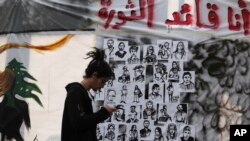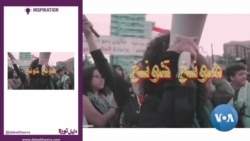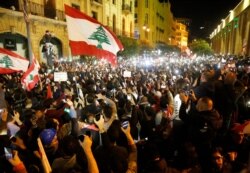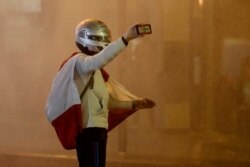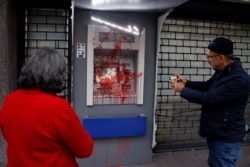From Hong Kong to Iraq to Chile, massive street protests have erupted in recent months over frustration with political injustice, widespread unemployment and corruption.
But in Lebanon, where most media outlets have strong political leanings, the largest anti-government protests in decades have been unfolding amid a virtual blackout of domestic news-media coverage.
Sparked by a fall 2019 proposal for new taxes, Lebanon's nationwide demonstrations have grown into calls to topple the political elite that has run the country since a civil war ended in 1990.
Until Tuesday, the country had been without a functioning government since Prime Minister Saad Hariri's Oct. 29 resignation, a key demand of protesters.
"This revolution, like in Hong Kong, is about choices," says political activist Eli Khoury, founder and CEO of Beirut-based Quantum Group, a private communications group.
"The choice is, do you want to be part of the free world, the West, or do you want to be part of the monolithic, dark East?"
Fractious, crowded media sphere
Given the strongly partisan leanings in Lebanese news media, some activists have created their own outlets to report on events unfolding in the streets, and to plan demonstrations.“
Most of this revolution is happening on WhatsApp," says Khoury, explaining that such encrypted communications platforms allow protesters to coordinate efforts anonymously.
"People are organizing themselves, debating the issues, doing what they need to do on WhatsApp, and then posting on social media," he said.
"It’s only smart not to name your leadership because they can kill them, they can character assassinate them, they can jail them," Khoury said, referring to a series of political assassinations that, since 2005, targeted Lebanese leaders opposed the Syrian-backed regime in Lebanon.
"We’ve seen that happen a million times, so people have learned," he says.
One victim was Gebran Tueni, a politician and, at the time of his assassination, editor of An Nahar newspaper.
Tueni’s daughter, Nayla al-Tueni, a one-time politician and An Nahar ’s acting editor-in-chief, says her father would be proud of the patriotism that has united Lebanese citizens across faiths and political sects in the movement.
"Fifteen years after they killed him, he is still present, he is still here in the heart of the people," she told VOA. "They want people like him, they want people who are thinking of the country, the best for the country, of a free Lebanon."
Financial straits, charges of meddling
But An Nahar, a leading Arabic-language daily, is struggling to survive Lebanon’s economic and political crises, even launching a campaign called #donateink asking readers to financially support their newsroom.
Long known as a pro-Western, center-left, family-owned publication that isn’t tied to any particular party, An Nahar was once described as “Lebanon’s equivalent of The New York Times,” with op-ed contributors from across the political spectrum.
"If you want to be free, if you don’t want to be funded by a political party or leader, you have to have your freedom," al-Tueni said, describing the newspaper's fundraising campaign. "And this is why we ask people to donate 'ink': Because we need to survive, we have to continue, we have to fight — and the journalists, they are really fighters."
Although government officials did not respond to VOA requests for commentary, Hezbollah leader Hassan Nasrallah has publicly accused the United States and other foreign governments of financing the protest movement, a charge the U.S. denies.
Activists have launched a grassroots social media campaign of their own, in which a diverse range of anonymous Lebanese nationals post video-shorts professing: “I am a Lebanese citizen, and I am funding the revolution.”
Hezbollah rising
Since achieving independence from French colonial rule in the 1940s, Lebanon has been governed by a power-sharing system aimed at representing all religious groups, the three largest being Christian Maronites, Sunni Muslims, and Shi'ite Muslims.
In 2019, Lebanon's heavily armed Hezbollah Islamist movement, which has long functioned as an Iranian-financed, state-within-a-state in the country's predominantly Shi'ite south, made substantial parliamentary gains, throwing impending government reforms promised by Hariri’s former majority into question.
President Michel Aoun's late-December appointment of Hezbollah-backed Prime Minister Hassan Diab — widely viewed as a move to break the political impasse — has done little to appease protesters who've long called for appointments of apolitical technocrats.
Diab unveiled his cabinet picks on Tuesday, which included no members of Hariri’s Sunni party and is composed almost entirely of Hezbollah allies. Although his picks included an unprecedented number of technocratic ministers – including a large number of whom are women – protesters were quick to reject it.“
We want a government of experts ... who are they kidding?” protester Fadi Zakour told The Associated Press. “We have been protesting for 90 days and we are not happy to close roads.”
Attacking ATMs
Since protests aimed at the country’s elite erupted on Oct. 17, commercial banks seen as bearing part of the blame for the crisis have been targeted, including in late-night riots last week that left bank facades smashed and ATMs destroyed in Beirut’s Hamra district.
The unrest grew increasingly violent on January 15 and 16, when police armed with batons and tear gas injured and arrested dozens as protesters lit fires and smashed bank facades and ATMs.
Lebanon’s Internal Security Forces (ISF) said 100 policemen were injured, while a security service source told the Associated Press at least 80 protesters were injured and another 72 were arrested.
Many of those in detention were quickly released, the source said.
In November, one protester was shot and killed after an altercation with Lebanese soldiers near Beirut; army officials said the troop, who had since been detained for investigation, opened fire to disperse the crowd.
Human Rights Watch on Friday called on Lebanon's Interior Ministry to hold police officers accountable for using excessive force to arrest a group of largely peaceful protesters on Jan. 15.
"At around 9:15 p.m., the Internal Security Force’s riot police charged onto the crowds, firing large amounts of teargas at protesters, beating some severely, and violently arresting at least 55," said a statement by the New York-based rights group. "Riot police also beat at least eight media workers covering the protests and briefly detained three."
On Tuesday, Amnesty International decried the use of force against protesters following violence over the weekend that left hundreds wounded.
This story originated in VOA's French to Africa Service. Pete Cobus contributed reporting from Washington.




